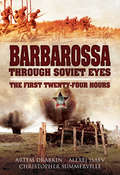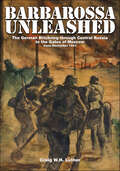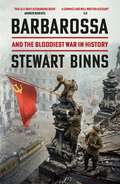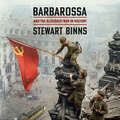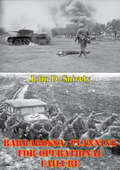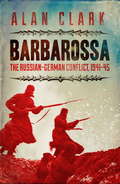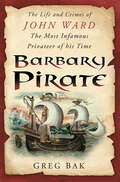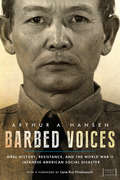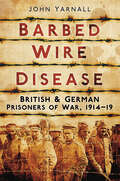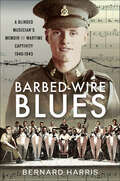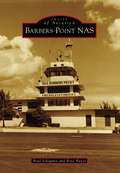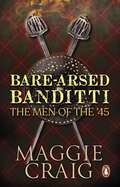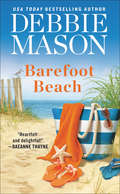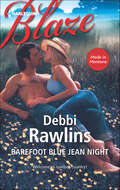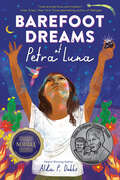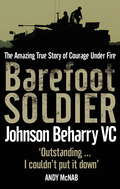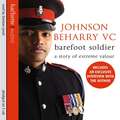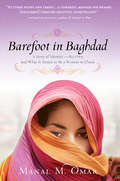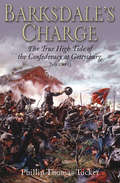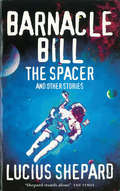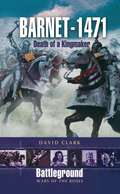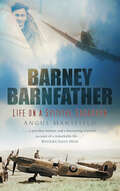- Table View
- List View
Barbarossa Through Soviet Eyes: The First Twenty-Four Hours
by Artem Drabkin22 June 1941 changed the direction of the Second World War. It also changed the direction of human history. Unleashing a massive, three-pronged assault into Soviet territory, the German army unwittingly created its own nemesis, forging the modern Russian state in the process. Thus, for most Russians, 22 June 1941 was a critical point in their nation's history. After the first day of Barbarossa nothing would be the same again for anyone. Now, for the first time in English, Russians speak of their experiences on that fatal Sunday. Apparently caught off guard by Hitlers initiative, the Soviets struggled to make sense of a disaster that had seemingly struck from nowhere. Here are generals scrambling to mobilize ill-prepared divisions, pilots defying orders not to grapple with the mighty Luftwaffe, bewildered soldiers showing individual acts of blind courage, and civilians dumbstruck by air raid sirens and radio broadcasts telling of German treachery.
Barbarossa Unleashed: The German Blitzkrieg through Central Russia to the Gates of Moscow, June–December 1941
by Craig W.H. LutherThis book examines in unprecedented detail the advance of Germany's Army Group Center through central Russia, toward Moscow, in the summer of 1941, followed by brief accounts of the Battle of Moscow and subsequent winter battles into early 1942. Based on hundreds of veterans&’ accounts, archival documents, and exhaustive study of the pertinent primary and secondary literature, the book offers new insights into Operation Barbarossa, Adolf Hitler&’s attack on Soviet Russia in June 1941. While the book meticulously explores the experiences of the German soldier in Russia, in the cauldron battles along the Minsk-Smolensk-Moscow axis, it places their experiences squarely within the strategic and operational context of the Barbarossa campaign. Controversial subjects, such as the culpability of the German eastern armies in war crimes against the Russian people, are also examined in detail. This book is the most detailed account to date of virtually all aspects of the German soldiers&’ experiences in Russia in 1941.
Barbarossa: And the Bloodiest War in History
by Stewart BinnsDrawing on remarkable and never-before-seen material, the extraordinary story of one of the most horrific and devastating encounters of the Second World War.On June 22nd, 1941 the largest military invasion in human history was launched - an attack on the Soviet Union by almost four million men of Nazi Germany's brutal war machine.Operation Barbarossa led to the bloodiest military campaign mankind has ever known. The statistics of death and destruction are almost impossible to believe. The cruelty, suffering and destitution it wrought are unimaginable . . . over forty million people lost their lives.Yet, the real story of the Eastern Front is still not truly understood outside of Germany and Eastern Europe. Little is known of those who suffered in the horror of Hitler's 'War of Annihilation' - the soldiers and civilians of Eastern Europe who fought and died trying to save their homelands and their loved ones.In Barbarossa, Stewart Binns tells the story of how they lived and survived, and how, once the tide had turned, they exacted an appalling revenge on the Nazi aggressors. This is the story of the bloodiest war in history.'This is a truly astounding book, packed with searing hitherto-unpublished testimony about what it was like to endure, and ultimately defeat, the most formidable invasion in the history of Mankind.' - Andrew Roberts, author of CHURCHILL: WALKING WITH DESTINY'A masterful narrative, deeply enriched by extraordinary research and a profound analysis of the soul of Russia.' - Nick Hewer
Barbarossa: And the Bloodiest War in History
by Stewart BinnsDrawing on remarkable and never-before-seen material, the extraordinary story of one of the most horrific and devastating encounters of the Second World War.'This is a truly astounding book, packed with searing hitherto-unpublished testimony about what it was like to endure, and ultimately defeat, the most formidable invasion in the history of Mankind. The sheer endurance of the Russian people between 1941 and 1945 will leave readers utterly staggered. It is a debt that we in the West should do more to acknowledge.' - Andrew Roberts, author of CHURCHILL: WALKING WITH DESTINYSunday June 22nd 1941: almost 4 million Nazi troops marched on Moscow, with a brutal scorched-earth tactic that saw millions of Soviet citizens massacred. A level of brutality only paralleled after the Soviet's triumphed at Stalingrad, and took mindless revenge as they marched back into Berlin.Beginning with Operation Barbarossa, the German invasion of the Soviet Union in June 1941, to the appalling circumstances of the Fall of Berlin in April 1945 and told from the perspective of the people of Russia and Eastern Europe, Barbarossa is a heartrending story of tragedy, suffering and heroism.Stewart Binns draws on Russian archives to paint a uniquely intimate picture of the war from the Soviet side of this terrible conflict - presenting this dark moment in history in panoramic detail, matching sweeping accounts of tactical manoeuvres with harrowing personal stories of civilian hardship and bravery.'A masterful narrative, deeply enriched by extraordinary research and a profound analysis of the soul of Russia.' - Nick Hewer(P)2021 Headline Publishing Group Ltd
Barbarossa: Planning For Operational Failure
by John D. SnivelyThe German planning process for the 1941 invasion of Soviet Russia is analyzed through the presentation of the major plans developed from July 1940 until June 1941. The final plan is then critiqued within the context of the applicable Principles of War. The planning process was characterized by significant disagreements between Hitler, the German High Command and the Army High Command. The major points of contention relate to the selection of primary objectives and force deployment patterns. A set of conclusions is presented which argues that the planning process was faulty due to a number of assumptions which were generally held by the officers who were involved in the process.
Barbarossa: The Russian German Conflict
by Alan ClarkThe classic account of the war on the Eastern Front between the Russians and the Germans - the greatest clash of arms the world has ever seen.Carefully researched and beautifully written, this book is a classic of military history. Alan Clark vividly narrates the course of the dramatic and brutal war between the German and Russians on the Eastern Front during the Second World War. From the invasion of Russia mounted on Midsummer's Day 1941 and the German Army's advance to the outskirts of Moscow, to the terrible turning point of Stalingrad and the eventual defeat of the Nazis at the Fall of Berlin after the hard years of fighting and advance by the Red Army, this is epic history narrated by a master.
Barbarossa: The Russian German Conflict
by Alan ClarkThe classic account of the war on the Eastern Front between the Russians and the Germans - the greatest clash of arms the world has ever seen.Carefully researched and beautifully written, this book is a classic of military history. Alan Clark vividly narrates the course of the dramatic and brutal war between the German and Russians on the Eastern Front during the Second World War. From the invasion of Russia mounted on Midsummer's Day 1941 and the German Army's advance to the outskirts of Moscow, to the terrible turning point of Stalingrad and the eventual defeat of the Nazis at the Fall of Berlin after the hard years of fighting and advance by the Red Army, this is epic history narrated by a master.
Barbary Pirate: The Life and Crimes of John Ward
by Greg BakIn 1603 John Ward led a mass desertion from the English navy, stole a ship and defected to the Ottoman Empire's outpost at Tunis. Allied with the pasha, Ward led Muslim soldiers and sailors in devastating attacks against Christian shipping. Wealthy as a lord, Ward purchased a palatial mansion in Tunis and presided over a scruffy band of English and European renegades.But Ward could not purchase a return to England. When his offers to trade gold for a pardon were rejected by the king, he converted to Islam and settled in Tunis, scandalising Christians throughout Europe. Ward becmae infamous as the admiral of a fleet of English ships sailing under the Ottoman crescent, and for not schooling Muslims in English sailing and gunnery.Was John Ward a traitor, or did England betray him? Barbary Pirate charts the treacherous waters of personal honour, international intrigue and national aspiration, even while recouting the daring exploits and seaborne battles that secured Ward's fame.
Barbed Voices: Oral History, Resistance, and the World War II Japanese American Social Disaster (Nikkei in the Americas)
by Arthur A. HansenBarbed Voices is an engaging anthology of the most significant published articles written by the well-known and highly respected historian of Japanese American history Arthur Hansen, updated and annotated for contemporary context. Featuring selected inmates and camp groups who spearheaded resistance movements in the ten War Relocation Authority–administered compounds in the United States during World War II, Hansen’s writing provides a basis for understanding why, when, where, and how some of the 120,000 incarcerated Japanese Americans opposed the threats to themselves, their families, their reference groups, and their racial-ethnic community. What historically was benignly termed the “Japanese American Evacuation” was in fact a social disaster, which, unlike a natural disaster, is man-made. Examining the emotional implications of targeted systemic incarceration, Hansen highlights the psychological traumas that transformed Japanese American identity and culture for generations after the war. While many accounts of Japanese American incarceration rely heavily on government documents and analytic texts, Hansen’s focus on first-person Nikkei testimonies gathered through powerful oral history interviews gives expression to the resistance to this social disaster. Analyzing the evolving historical memory of the effects of wartime incarceration, Barbed Voices presents a new scholarly framework of enduring value. It will be of interest to students and scholars of oral history, US history, public history, and ethnic studies as well as the general public interested in the WWII experience and civil rights.
Barbed Wire Disease: British & German Prisoners of War, 1914-19
by John YarnallBy the time of the Armistice in 1918, some 6.5 million prisoners of war were held by the belligerents. Little has been written about these prisoners, possibly because the story is not one of unmitigated hardship and cruelty. Nevertheless, hardships did occur and the alleged neglect and ill-treatment of prisoners captured on the Western Front became the subject of major propaganda campaigns in Britain and Germany as the war progressed. 'Barbed Wire Disease' looks at the conditions facing those prisoners and the claims and counter-claims relating to their treatment. At the same time, it sets the story in the wider context of the commitment by both governments to treat prisoners humanely in accordance with the recently agreed Hague and Geneva Conventions. The political and diplomatic efforts to achieve this are examined in detail, and it concludes by examining the failed first-ever efforts to bring war criminals to justice before international tribunals.
Barbed-Wire Blues: A Blinded Musician’s Memoir of Wartime Captivity 1940–1943
by Bernard Harris“Quite uplifting . . . This book looks less at the usual escape attempts but concentrates on lifting people of the camp through entertainment.” —UK HistorianAs the author, a young Army bandsman lies wounded at the Battle of Corinth, he is shot between the eyes at point blank range. Miraculously he survives but is blinded. In a makeshift hospital a young Greek volunteer saves his life with slices of boiled egg. Captured Allied medics later restore the sight in one eye.In this moving and entertaining memoir Bernard describes daily life in POW camps in Greece and Germany. He established a theatrical group and an orchestra that performed for fellow POWs and their German guards. A superb raconteur, as well as a gifted musician, the author’s anecdotes are memorably amusing. Bernard was repatriated via Sweden in late 1943.While blinded in one eye and seriously wounded, the author was told by his New Zealand doctor, fellow POW and musician John Borrie, “When nothing else will do, music will always lift one up.” Barbed-Wire Blues’ inspirational, ever optimistic tone will surely have the same effect on its readers.“While not a story of blood, guts and bullets it does do a very good job of telling the story of a man’s recovery from a wound that should have killed him until his repatriation and the return of the use of his arm, and then the return of the sight to one eye. This book is worth taking the time to read, as it can be considered to be the story of one man’s battle against adversity.” —Armorama
Barbers Point NAS (Images of Aviation)
by Brad Hayes Brad SekigawaRising from the ashes of the Pearl Harbor attack, Barbers Point Naval Air Station would become a major staging point for US Navy aircraft for the war in the Pacific, culminating with the surrender of the Empire of Japan. With the end of World War II in the Pacific and throughout the Cold War, Barbers Point would be home base for the US Navy's fleet of maritime patrol aircraft that hunted the growing threat of Soviet submarines prowling the vast Pacific. From 1942 until its closing in 1999, Barbers Point was the US Navy's only naval air station in the Pacific.
Bare-Arsed Banditti: The Men of the '45
by Maggie Craig'Deftly told' The HeraldThey were modern men, the soldiers of the '45: doctors and lawyers, students and teachers, gardeners and weavers. These are the men often written out of history, or else depicted as gallant but misguided fools. But in reality they were children of the Age of Reason, they wrote poetry, discussed the latest ideas in philosophy and science - and rose in armed rebellion against the might of the British crown and government. Many faced agonising personal dilemmas before committing themselves to Bonnie Prince Charlie and the Jacobite Cause. Few had any illusions about the consequences of failure. Many met their date with destiny on Culloden Moor, players in a global conflict that shaped the world we live in today. Combining meticulous research with entertaining and stylish delivery, Maggie Craig tells the dramatic and moving stories of the men who were willing to risk everything for their vision of a better future for themselves, their families and Scotland. 'A superbly structured work, written with passion and conviction' Scots Magazine
Bared and Wicked Sexy
by Jill Shalvis Anne MarshNew York Times bestselling authors Jill Shalvis and Anne Marsh offer two sexy stories where everything starts with taking a chance… Bared by Jill ShalvisEmma Willis never saw herself as a model—until she has to do a photo shoot in her twin sister's place. When Emma puts on barely-there lingerie in front of the photographer, Rafe Delacantro, she feels sexy…and more uninhibited than she's ever been. Rafe knows Emma’s not the model he's expecting. But the more time he spends in her seductive presence, the more he wants. He now has to convince her that their affair can last after the camera is put away….Wicked Sexy by Anne MarshDanielle Andrews was supposed to be on her honeymoon. Instead, she's back on Discovery Island licking her wounds and running for shelter when she sees Daeg Ross coming her way. Years ago, on this very beach, Dani started something with the special ops aviation rescue swimmer. But she refuses to be tempted by the wickedly hot military hunk again…
Barefoot Beach (Harmony Harbor #8)
by Debbie MasonCan a summer of love make up for a lifetime of secrets?Wedding fever has taken over Harmony Harbor this summer, and the local matchmakers have set their sights on Theia Lawson, a former navy pilot who's in town for a stay at Greystone Manor. And while Theia's got her reasons to put this small town behind her as fast as she can, there's a certain tall, dark, and irresistible man that she can't seem to get off her mind. Firefighter Marco DiRossi wants to beat the matchmakers at their own game so he conspires with Theia to pretend they've already fallen in love. It's only for the summer. What could go wrong? Yet as the beach season draws to a close, Marco and Theia find their pretend relationship has led to very real attraction. But when a secret from the past is revealed, jeopardizing everything they hold dear, can this unlikely couple find their way to a happily-ever-after?
Barefoot Blue Jean Night (Made in Montana)
by Debbi RawlinsDestination: Sundance Dude Ranch-Blackfoot Falls, MontanaActivities: Horseback riding, rodeos, guided hikes...and lots of cowboy action!The moment she sees the ad for Sundance Dude Ranch-featuring the rugged McAllister brothers-travel blogger Jamie Daniels can't resist booking. After all, a week of fresh air and scenery will do her good...especially if that scenery includes Cole McAllister's very fine backside!Cole's not thrilled about playing host to hordes of ogling women. But when he's wrangled into showing Jamie the ropes, his reluctance is conspicuously absent. In fact, there's nothing he'd like more than to give Jamie a cowboy experience she won't ever forget....
Barefoot Dreams of Petra Luna (Barefoot Dreams of Petra Luna)
by Alda P. Dobbs2022 Pura Belpré Honor BookNYPL Best Book of 2021Texas Bluebonnet Master List SelectionNPR Best Book of 2021Based on a true story, the tale of one girl's perilous journey to cross the U.S. border and lead her family to safety during the Mexican Revolution."Wrenching debut about family, loss, and finding the strength to carry on."—Booklist, starred review"Blazes bright, gripping readers until the novel's last page."—Publishers Weekly, starred review"Vital and perilous and hopeful."—Alan Gratz, New York Times bestselling author of RefugeeIt is 1913, and twelve-year-old Petra Luna's mama has died while the Revolution rages in Mexico. Before her papa is dragged away by soldiers, Petra vows to him that she will care for the family she has left—her abuelita, little sister Amelia, and baby brother Luisito—until they can be reunited. They flee north through the unforgiving desert as their town burns, searching for safe harbor in a world that offers none.Each night when Petra closes her eyes, she holds her dreams close, especially her long-held desire to learn to read. Abuelita calls these barefoot dreams: "They're like us barefoot peasants and indios—they're not meant to go far." But Petra refuses to listen. Through battlefields and deserts, hunger and fear, Petra will stop at nothing to keep her family safe and lead them to a better life across the U.S. border—a life where her barefoot dreams could finally become reality."Dobbs' wrenching debut, about family, loss, and finding the strength to carry on, illuminates the harsh realities of war, the heartbreaking disparities between the poor and the rich, and the racism faced by Petra and her family. Readers will love Petra, who is as strong as the black-coal rock she carries with her and as beautiful as the diamond hidden within it."—Booklist, starred review
Barefoot Soldier
by Johnson BeharryBorn in 1979 in Grenada as one of eight children, living in a two-bedroom hut, surviving on meagre meals of beans and rice and walking barefoot, three miles to school. At 13 Johnson Beharry quit school and worked as a decorator and labourer. In 1999 he scraped together the airfare for England and joined the Princess of Wales's Royal Regiment. He served six months in Kosovo, three months in Northern Ireland and then went to Iraq. On 1 May 2004, Beharry helped assist a foot patrol caught in a series of ambushes. His vehicle was hit by multiple rocket propelled grenades but he drove through the ambush and extracted his wounded colleagues from the vehicle, all the time exposed to further enemy fire. He was cited on this occasion for 'valour of the highest order'. While back on duty on 11 June 2004, a rocket propelled grenade hit Beharry's vehicle incapacitating his commander and injuring several of the crew. Despite his very serious head injuries, Beharry took control of his vehicle and drove it out of the ambush area before losing consciousness. He required brain surgery for his head injuries, and he was still recovering when he was awarded the VC in March 2005.
Barefoot Soldier
by Johnson Beharry VCBorn in 1979 in Grenada as one of eight children, living in a two-bedroom hut, surviving on meagre meals of beans and rice and walking barefoot, three miles to school. At 13 Johnson Beharry quit school and worked as a decorator and labourer. In 1999 he scraped together the airfare for England and joined the Princess of Wales's Royal Regiment. He served six months in Kosovo, three months in Northern Ireland and then went to Iraq. On 1 May 2004, Beharry helped assist a foot patrol caught in a series of ambushes. His vehicle was hit by multiple rocket propelled grenades but he drove through the ambush and extracted his wounded colleagues from the vehicle, all the time exposed to further enemy fire. He was cited on this occasion for 'valour of the highest order'. While back on duty on 11 June 2004, a rocket propelled grenade hit Beharry's vehicle incapacitating his commander and injuring several of the crew. Despite his very serious head injuries, Beharry took control of his vehicle and drove it out of the ambush area before losing consciousness. He required brain surgery for his head injuries, and he was still recovering when he was awarded the VC in March 2005.
Barefoot Soldier
by Johnson Beharry VC**INCLUDES AN EXCLUSIVE INTERVIEW WITH THE AUTHOR**Born in 1979 in Grenada as one of eight children, living in a two-bedroom hut, surviving on meagre meals of beans and rice and walking barefoot, three miles to school. At 13 Johnson Beharry quit school and worked as a decorator and labourer. In 1999 he scraped together the airfare for England and joined the Prince of Wales' Royal Regiment. He served six months in Kosovo, three months in Northern Ireland and then went to Iraq. On 1 May 2004, Beharry helped assist a foot patrol caught in a series of ambushes. His vehicle was hit by multiple rocket propelled grenades but he drove through the ambush and extracted his wounded colleagues from the vehicle, all the time exposed to further enemy fire. He was cited on this occasion for 'valour of the highest order'. While back on duty on 11 June 2004, a rocket propelled grenade hit Beharry's vehicle incapacitating his commander and injuring several of the crew. Despite his very serious head injuries, Beharry took control of his vehicle and drove it out of the ambush area before losing consciousness. He required brain surgery for his head injuries, and he was still recovering when he was awarded the VC in March 2005.
Barefoot in Baghdad: A Story of Identity-My Own and What It Means to Be a Woman in Chaos
by Manal M. Omar"Walk barefoot and the thorns will hurt you. . . " -Iraqi-Turkmen proverb. A riveting story of hope and despair, of elation and longing, Barefoot in Baghdad takes you to the front lines of a different kind of battle, where the unsung freedom fighters are strong, vibrant-and female. An American aid worker of Arab descent, Manal Omar moves to Iraq to help as many women as she can rebuild their lives. She quickly finds herself drawn into the saga of a people determined to rise from the ashes of war and sanctions and rebuild their lives in the face of crushing chaos. This is a chronicle of Omar's friendships with several Iraqis whose lives are crumbling before her eyes. It is a tale of love, as her relationship with one Iraqi man intensifies in a country in turmoil. And it is the heartrending stories of the women of Iraq, as they grapple with what it means to be female in a homeland you no longer recognize.
Barksdale's Charge: The True High Tide of the Confederacy at Gettysburg, July 2, 1863
by Phillip Thomas TuckerThere is &“never a dull moment&” in this &“excellent account&” of an overlooked Confederate triumph during the Civil War&’s Battle of Gettysburg (San Francisco Book Review). While many Civil War buffs celebrate Picket&’s Charge as the climactic moment of the Battle of Gettysburg, the Confederate Army&’s true high point had come the afternoon before. When Longstreet&’s corps triumphantly entered the battle, the Federals just barely held on. The foremost Rebel spearhead on that second day of the battle was Brig. Gen. William Barksdale&’s Mississippi brigade, which launched what one Union observer called the &“grandest charge that was ever seen by mortal man.&” On the second day of Gettysburg, the Federal left was not as vulnerable as Lee had envisioned, but had cooperated with Rebel wishes by extending its Third Corps into a salient. When Longstreet finally gave Barksdale the go-ahead, the Mississippians utterly crushed the peach orchard salient and continued marauding up to Cemetery Ridge. Hancock, Meade, and other Union generals had to gather men from four different corps to try to stem the onslaught. Barksdale himself was killed at the apex of his advance. Darkness, as well as Confederate exhaustion, finally ended the day&’s fight as the shaken, depleted Federal units took stock. They had barely held on against the full ferocity of the Rebels on a day that would decide the fate of the nation.
Barnacle Bill the Spacer and Other Stories
by Lucius ShepardThis collection by Lucius Shepard, one of the most exciting new writers to emerge in the 1980s, includes the eponymous story ¿Barnacle Bill the Spacer¿, about an attempted mutiny on a space station, which won the Hugo Award, as well as ¿Sports in America¿, about a man who finds out just how far he is willing to go when he is hired by a local crime boss to kill a man. In ¿All the Perfumes of Araby¿ a small-time smuggler is granted a vision of the future that compels him to change his life, while ¿Human History¿ is a post-apocalyptic adventure story with a hint of decadence. ¿The Sun Spider¿ is a romance of sorts, with a decidedly gothic twist, while in ¿Beast of the Heartland¿, a boxer at the end of his career is lured back into the ring with the promise of one last big payoff. And anyone who has ever completely lost themselves in a piece of music will recognise the inspiration for ¿A Little Night Music¿. Shepard's stories are not just wonderfully three-dimensional characters dealing with life-changing events; they are filled with colours, textures, sounds and smells, as he describes his backgrounds with as much care as a master painter.
Barnet 1471: Death of a Kingmaker (Battleground Wars of the Roses)
by David ClarkOn 14 April 1471 the forces of Lancaster under the Earl of Warwick and those of York under Edward IV clashed at Barnet in Hertfordshire in one of the decisive battles of the Wars of the Roses. In a bloody encounter the two armies fought to resolve a bitter dynastic dispute that had already fuelled twenty years of war. Warwick's death and Edward's victory changed the course of English history.In this new guide to the battle, David Clark, one of the leading battlefield historians, gives a gripping account of the fighting and of the intrigue that led to it, and he provides a full tour of the battlefield itself.
Barney Barnfather: Life on a Spitfire Squadron
by Angus MansfieldRiversdale Robert 'Barney' Barnfather was an RAF fighter pilot who flew Spitfires in action almost continuously from November 1941 until the end of the war in Europe. Barney was often in the thick of the fighting and saw action in the offensive sweeps over France, in the desperate air battle for Malta, the fighting in North Africa, the invasions of Sicily and Italy, and finally on the fringes of the Third Reich over Austria in 1945. This type of experienced and brave pilot formed the backbone of Fighter Command and after many operational flying hours, clashes with enemy aircraft and even a mid-air collision, he survived it all relatively unscathed. Thanks to the fascinating personal log book that Barney kept of his experiences, the contributions from his former colleagues and extensive historical research, Angus Mansfield has produced a detailed and enthralling history of a Spitfire pilot's escapades thousands of feet above the battlefields of the Second World War.
